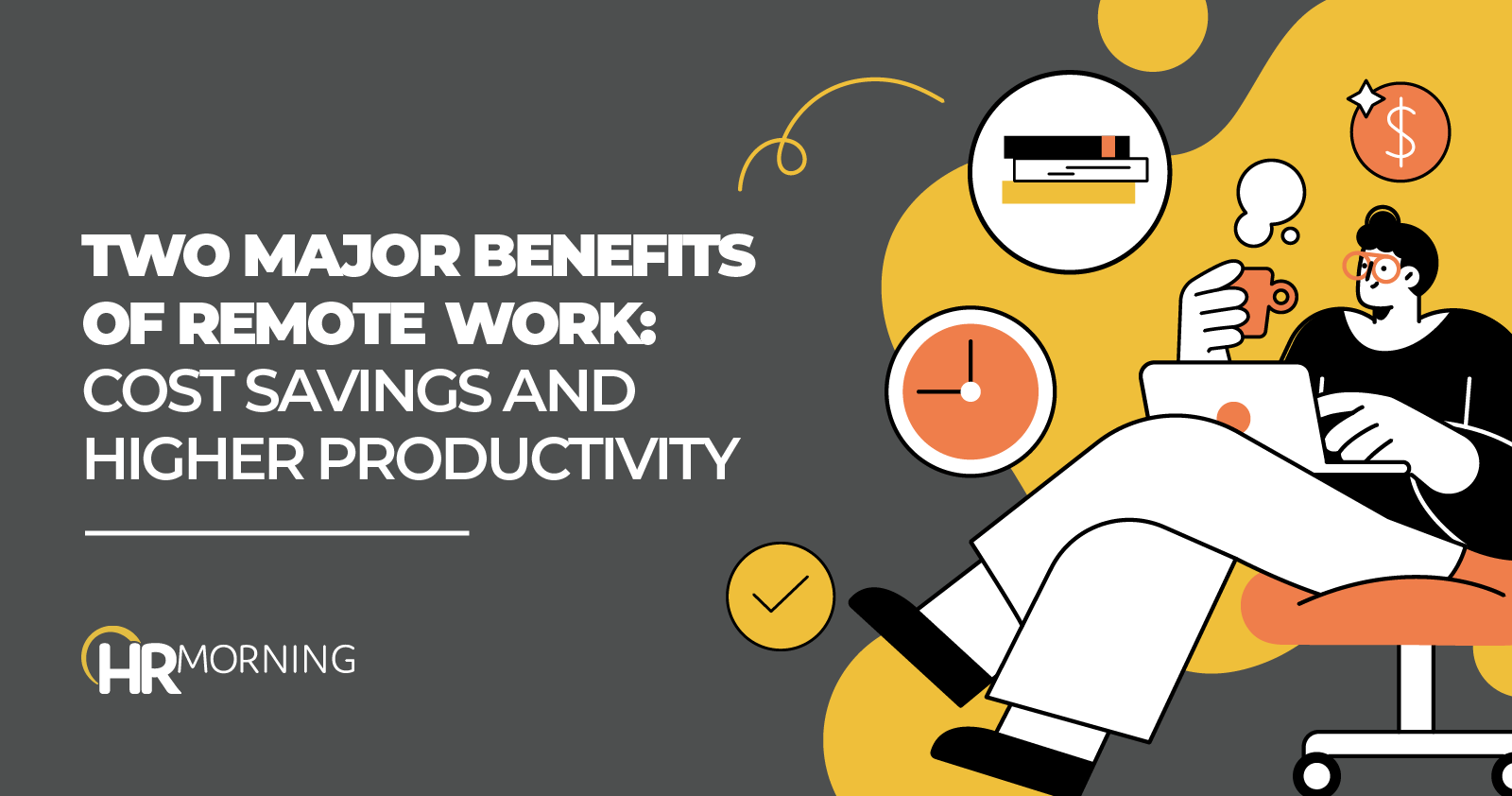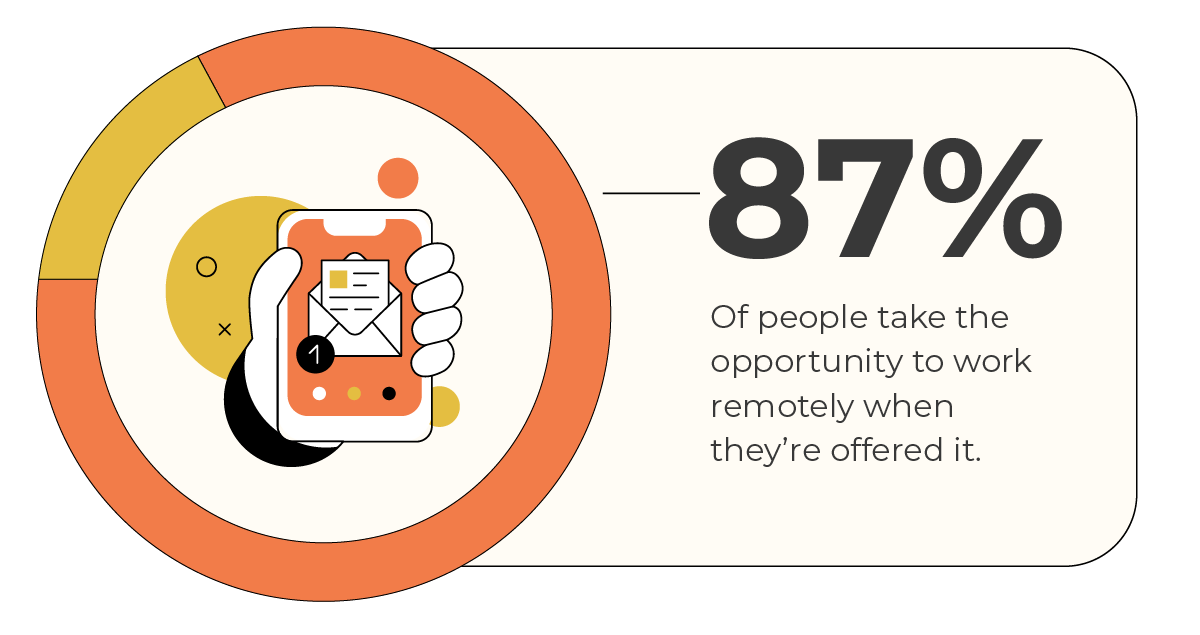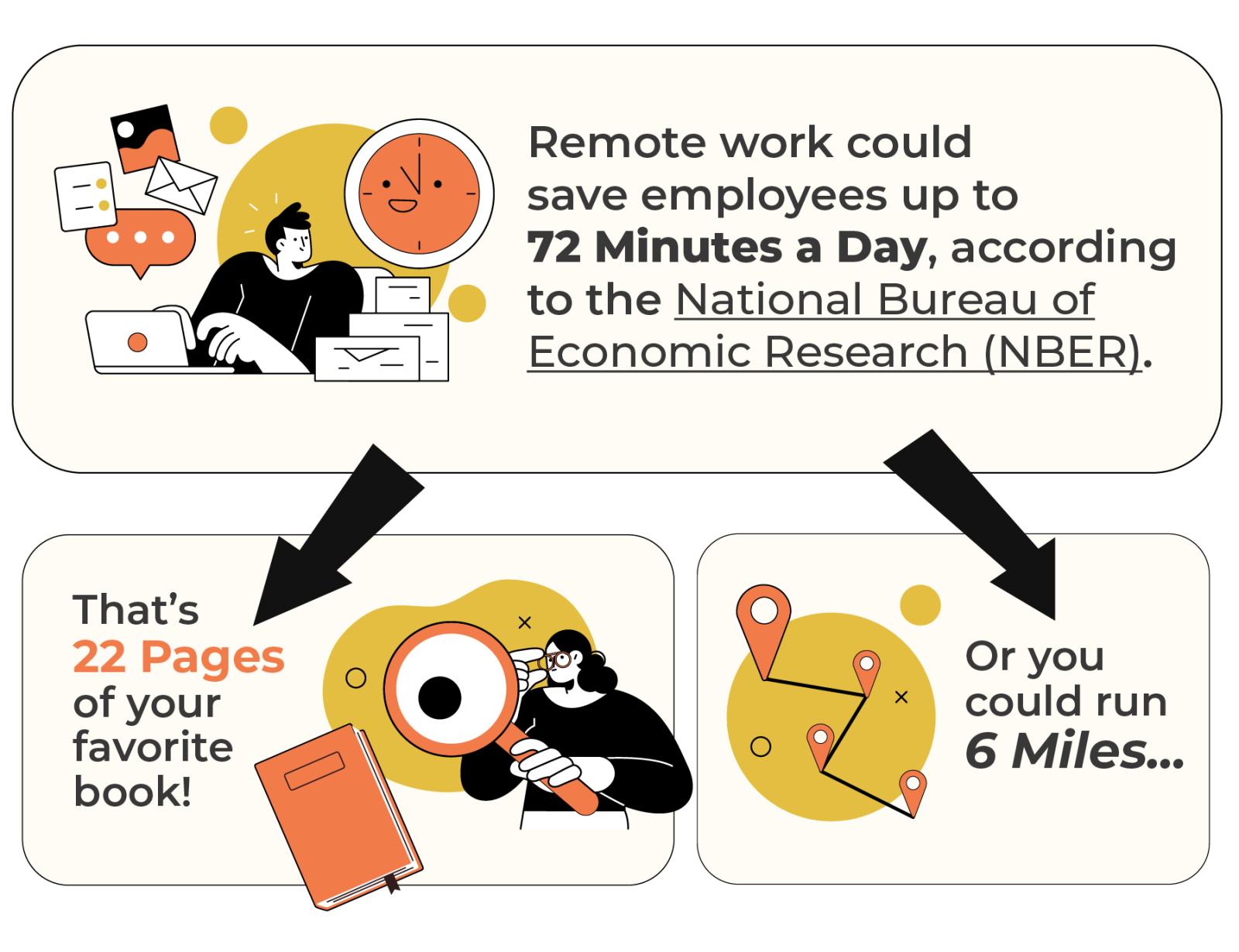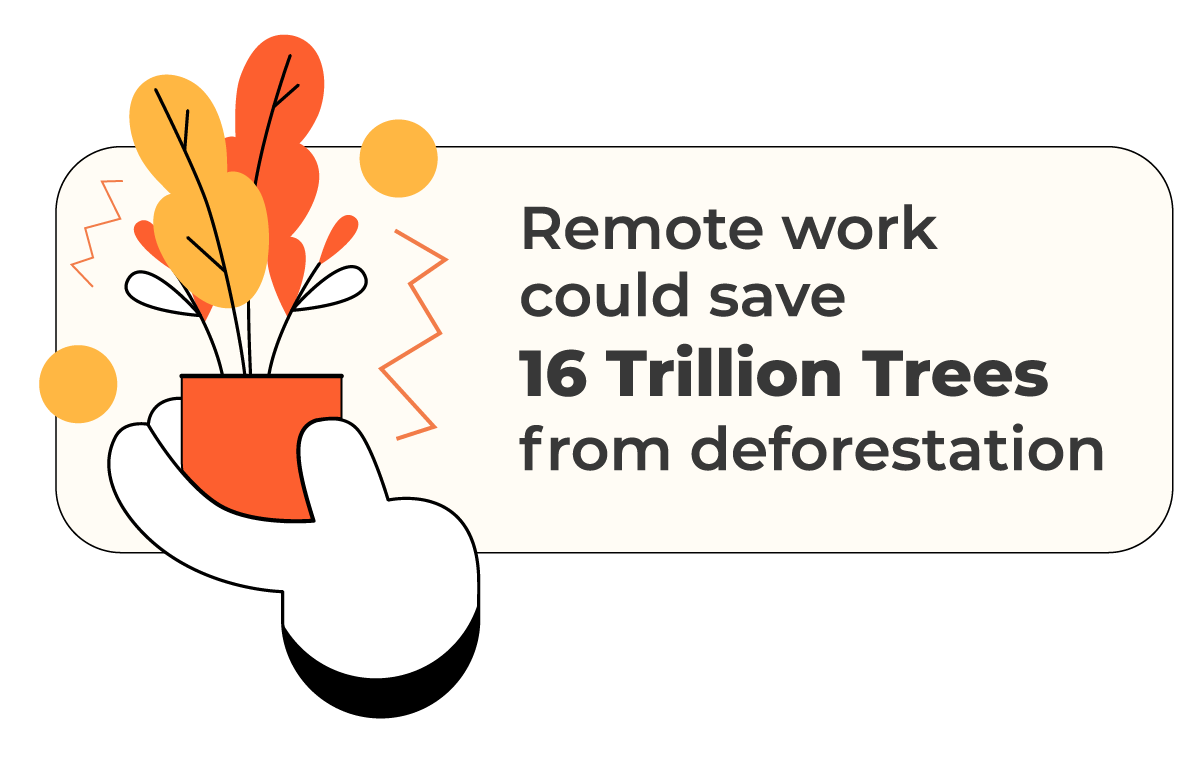
Benefits of remote work for both employees & employers
The pandemic permanently changed how we live and work. Businesses have had to revisit what it means to be a remote-first company to survive the modern world.
Now, if companies don’t offer at least hybrid work options, they risk losing not just potential candidates, but current employees, too.
Working remotely benefits employees and their employers in a range of ways.
In this article, we’ll explore the benefits of remote work for employees and employers, as well as look at some of the challenges it presents and what businesses can do to mitigate them.
Why remote work is important

Eighty-seven percent of people take the opportunity to work remotely when they’re offered it, according to research from McKinsey.
The research found that the same was true across all demographics.
When employees have flexibility at work, they get more time to spend with their loved ones or on their own hobbies. It can also save them time and money on things like their commute and lunch break.
For businesses, offering remote work or hybrid work widens the talent pool they have access to. It can increase candidate diversity, resulting in more creative problem solving and helping companies stand out from their competitors.
It can even make employees more productive, meaning businesses make more money.
Employee-focused advantages of remote work
As there are so many benefits of remote work for employees, it’s no surprise that so many now see it as a crucial part of any new job they apply for.
In fact, 54% of recruiters have seen a candidate say no to an offer of an interview or job because it lacked flexibility or remote work options. So, for most people, flexible work options are now non-negotiable.
Here are some of the benefits of remote work from an employee’s perspective that explains why increased flexibility in the workplace has become so important:
Better work-life balance
Working from home provides more flexible work options for employees, allowing them to work when they’re at their most productive instead of having to adhere to a strict office schedule.
A primary benefit of remote work for employees is that the increased flexibility gives them a far better work-life balance than office-based work.

Remote work could save employees up to 72 minutes a day, according to the National Bureau of Economic Research (NBER). We could all do a lot with an extra 72 minutes a day.
Flexible work makes it easier for them to balance their workload alongside their personal life.
The time savings that remote work offers employees means they can spend more time on their primary or secondary job (as 40% of employees do), deal with family commitments, attend health checkups, or manage chronic health problems without worrying about being late into the office or sacrificing their health for traditional office work.
Employees can work from where they’re most comfortable
Working from home allows employees to create an environment they know they can work well in. They can tailor their home office to suit their unique needs, helping them perform at their best all day, every day.
For example, some employees may struggle to work in an office because of unprompted distractions, noise levels, bright overhead lights, office temperatures that are too hot or cold for them, or the office atmosphere. All these things are subtle factors that negatively impact employee productivity.
And the more employees there are in one space, the harder it is to get those factors right for everyone.
When working from home, employees can remove these distractions, creating the optimum workspace for their personal needs. As a result, they’ll feel calmer, find it easier to concentrate and be more productive.
Supports employees’ physical and mental health
Managing any long-term health problem is stressful. Flexible work can make it easier for employees to do because they can work in their own space, which helps reduce some of the stress.
It allows them to adapt their work schedule based on the requirements of their health condition, even if those conditions are unpredictable, as some chronic illnesses are.
Telecommuting also gives employees the option to not share their health challenges with employers if they’re uncomfortable doing so, rather than feeling forced to share because it’s obvious when they’re onsite.
The extra time employees save by not commuting also gives them more time to rest, exercise, and cook healthy meals, further improving their well-being.
And, when it comes to short-term health, employees have more time to rest if they have a cold or an allergy flare-up.
Should remote employee work when they’re sick, there’s no risk of them passing on their germs to their colleagues and impacting someone else’s health or productivity.
Reducing environmental impact
Statista found that the average American spends 15 to 29 minutes per day commuting one way.
That’s an hour less per day of sleep, relaxation time or family time. All things that can impact an employee’s ability to perform at work.
A reduction in daily commutes puts less wear on employees’ cars, reduces their gas usage, and means they have less of an impact on the environment.
Because working from home means fewer cars out and about doing the daily commute, businesses and their employees have smaller carbon footprints.
Working from home further reduces their environmental impact, because employees don’t have to pack a lunch or go out and grab some food at lunchtime. This reduces the need for single-use plastics or other disposable items.

It’s estimated that remote work could save 16 trillion trees from deforestation, making a huge difference to any employee or business’s sustainability efforts.
Higher job satisfaction
Remote employees feel more in control of their workday – and how they spend their extra time after work.
They don’t have to worry about presenteeism, their boss watching their every move or colleagues interrupting them when they’re trying to focus. They’re more in control of their work environment and how they manage their workday. As a result, they experience higher job satisfaction.
Higher employee satisfaction means they’re loyal to their employer. Because of this, they’re less likely to leave.
This improvement in retention rates allows companies to spend the money they’ve saved on other areas of the business, like better employee benefits.
Employer-focused advantages of remote work
Employees who experience higher job satisfaction and a greater work-life balance are inevitably going to have a positive impact on their employer.
There are several other ways remote work can benefit businesses, too.
Here are some of the employer-focused benefits of remote working:
Various cost-savings
Because fewer – or even no – employees visit the office in person, the company will have to spend less money on utility bills, food, supplies and other expenses that come from accommodating office-based employees.
No office space also protects businesses from unexpected costs such as building or equipment repairs which can quickly get expensive and cut into company profits.
With fewer overheads, businesses can re-invest the money they’ve saved and use it on new perks or employee benefits, raises or other ways to support their remote teams.
You may even find that the benefits of remote work mean that some roles don’t need to be full-time.
Since remote employees are more productive, some roles may work on a part-time basis when they’re remote, resulting in even lower costs while opening you up to more diverse candidates. A part-time remote role could attract working parents, for example, who need a flexible schedule that works around childcare commitments.
Some companies that have opted to go fully remote have saved money on this transition, too.
Higher productivity
Almost half of managers find it hard to trust employees to do their best work when they work remotely. The same percentage of employees trust their managers.
A peer-reviewed study showed that call center staff who worked remotely were 13% more productive.
A University of Chicago study found that remote workers were, on average, 7% more productive than when they were in the office.
This is likely due to remote workers experiencing fewer distractions than their office-based counterparts.
Their colleagues can’t interrupt them when they’re concentrating, other people’s conversations are less likely to disrupt their focus, and they can put headphones on without worrying about being seen as rude by their colleagues.
Employees can also work when and where they’re most comfortable, making it easier for them to focus on the job.
All of this means that businesses experience higher productivity from their employees.
Employees also don’t have to be bound to work set hours. They can work at the times that are the most convenient for them – and when they’re the most productive.
For some people, that might be 11 p.m.; for others, it could be 5 a.m. But if it works for them, they don’t expect immediate responses from their colleagues, and they’re more productive, does it matter?
The focus of remote work is less on the hours employees spend super glued to their desks, and more on the quality of their work.
They don’t have to work a set amount of hours to “show off” in the workplace. They’re trusted to complete their responsibilities to a high standard.
This increased trust that comes from a company embracing remote work results in higher psychological safety, further improving employee engagement and job satisfaction.
Greater employee retention
Offering remote work improves employee retention because of the lower costs associated with telework.
Employees can save money on their commute, which in some places can cost hundreds per month.
As the cost-of-living crisis continues, this can be a huge selling point to potential candidates.
It’s also a reason for existing employees to stay and make their paychecks go further, rather than worry about the stress of job hunting and trying to find another remote or hybrid role.
Managers must trust their remote workers to do their job without watching them all day, too.
While this can make some managers uncomfortable, this increased trust improves employee morale. It reduces the friction employees experience at their jobs and boosts employee retention even more.
Fewer sick days and reduced absenteeism
If employees don’t need to worry about their commute or deal with traffic or public transport delays, it can help reduce absenteeism. It also makes it easier for them to manage family commitments that can conflict with attending the office in person.
Employees who don’t go into the office when sick won’t pass their germs on to their colleagues. Meaning fewer employees getting sick and the business loses less money to sick days.
Since remote employees spend more time working, it means more revenue and profits for their employers on top of the money they save.
Increased talent pool
Remote work environments have become one of the most important job criteria for more than half of potential candidates. Some candidates now won’t even consider applying for a role if it isn’t a remote job.
This means if you don’t offer flexible work arrangements, your talent pool is at risk of being significantly smaller than your competitors. And, as a result, a company may not grow as quickly.
Allowing employees to work remotely increases the size of a business’s talent pool because there are no geological barriers involved.
Remote employees can be based anywhere. Candidates don’t have to relocate for their new job, and the business gets to tap into new domestic and international candidates.
The perfect candidate for a role might be on the other side of the country. Or even in a different country altogether.
If you don’t acquire that talent, it’s likely one of your competitors will.
Because of the wider reach of your talent pool, it can lead to greater workplace diversity and the internal benefits that come from that, such as a more welcoming work environment, more creative problem-solving, and better idea generation.
Challenges to consider
Like with anything, remote work comes with challenges alongside its many benefits.
For example, it’s tempting for employees working from home to keep going beyond their set working hours to get something done.
If they do this too often, it puts them at risk of burnout. It’s a lot easier to work “just five more minutes” here or there when working from home, and for those “five minutes” to add up over a week or month without the employee realizing it.
And while many employees do focus better at home, some don’t feel the same way and prefer to work from a traditional office space.
Some employees will always prefer the social interaction that comes with having an office. They may also find it better for team collaboration and idea generation.
Juggling different time zones isn’t always easy, either. But that’s the beauty of Wi-Fi, Slack, and Zoom. There are thousands of tools out there to help you manage a remote workforce, keep them connected, and get the most out of them.
To mitigate these issues, make sure employees take breaks and aren’t spending too many hours working, and not enough hours away from their desks. You could also offer regular in-person gatherings to foster a sense of community and teamwork.
There’s also the possibility working remotely could impact the onboarding of new hires.
But if you have a solid onboarding process, that’s adapted to remote working, employees should still feel satisfied and want to stay.
There’s also the implication of “hush trips”, where employees work in a different state without telling their employer. This can open companies up to possible tax and other implications.
Win-win situation
Being part of a remote workforce can benefit every aspect of an employee’s life, from their hobbies to their sleep to their time with loved ones.
Having more time for these things improves employee well-being, which inevitably has a positive impact on job satisfaction and workplace productivity.
For employers, this improved productivity generates more money.
Not only that, but if a company is fully remote, it can save money on overheads and may be able to grow faster, putting it ahead of its competition.
Remote work requires a shift in company culture to be a success, but that shift can result in employees feeling more trusted at work, saving them time during the week, and improving company culture.
As more employees want to work remotely since the pandemic, not offering the opportunity of remote work narrows a company’s talent pool by limiting its location and reducing the number of candidates who are interested in an office-based role.
